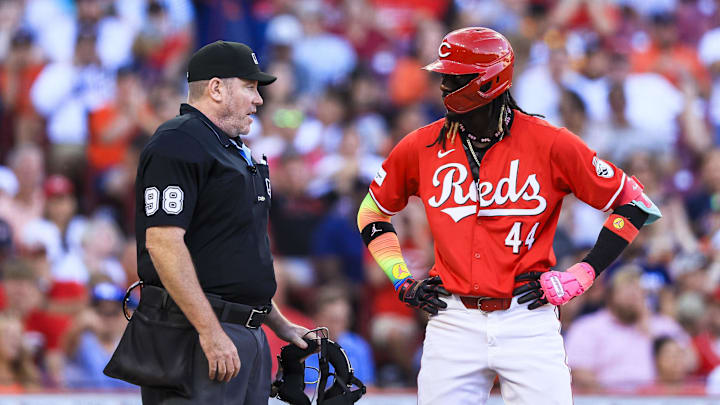Cincinnati Reds fans were not happy with home plate umpire Chris Segal on Wednesday night. A costly, rally-killing call during the eighth inning torpedoed any chance of a Reds come-from-behind win against the Seattle Mariners. But, in the grand scheme of things, there's a bigger issue at play that Major League Baseball must fix.
Batter interference was called on Reds outfielder Austin Hays during his at-bat in the eighth inning. Hays swung and missed at strike three and his momentum carried him out of the batters' box and into the throwing lane of Mariners' catcher Cal Raleigh. The Seattle backstop was attempting to throw out Elly De La Cruz who was intent on stealing second base.
Though De La Cruz reached the bag ahead of the tag, he was called out after Segal ruled that Hays interfered with Raleigh's attempt to gun down the Reds' speedy shortstop. Manager Terry Francona came out for clarification and received a satisfactory explanation, but the fans in attendance at Great American Ball Park were left dumbfounded. And that's the issue that MLB needs to correct.
Umpire's rally-killing call in Reds-Mariners game sparks confusion that must be fixed
Reds fans can sit back and criticize Segal's call until they're blue in the face, but the bigger issue is the lack of communication from the umpiring crew to the fans in attendance. MLB now has the technology readily available—the umpires are wearing microphones—so why in the world don't they use it?
How many Reds fans in attendance during Wednesday's game actually knew that batter interference was called? Furthermore, how many fans knew, that as a result, both Hays and De La Cruz were out? It's quite likely that less than half of those in attendance knew the rule, leaving the majority of those at the game befuddled.
The Reds crowd at least understood that it was a bad call—though even that's questionable—and boo'd the umpiring crew well into the ninth inning. But while the majority of the fans were booing Segal, some probably didn't even know why. Obscure and unfamiliar calls like batter interference, obstruction, and even ejections—that occur while play is stopped—should be announced over the microphone to inform those in attendance of what's actually happening. It could then even be relayed via the jumbo-screen at the ballpark.
This isn't rocket science, and it's not even mildly controversial. It's just common sense. It's time for MLB to fix this senseless oversight.
